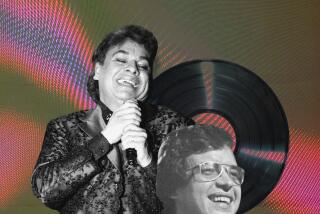Review: At the Latin Grammy Awards: ‘Despacito’ takes home 4 trophies; a performance in honor of ‘Dreamers’
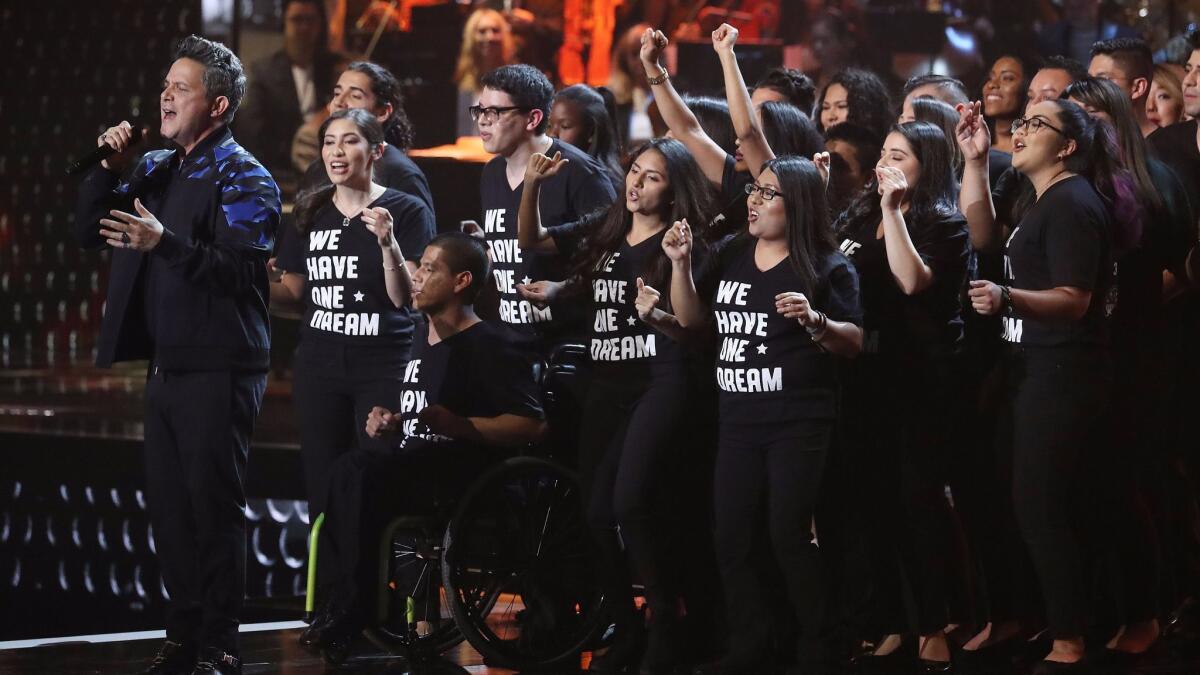
The show began with Puerto Rico and it ended with Puerto Rico.
The Latin Grammy Awards, held on Thursday evening at the MGM Grand Garden Arena in Las Vegas, started with a moment of silence in honor of the island, which was devastated by Hurricane Maria in September. And the show’s opening and closing numbers were performed by Puerto Rican stars.
Kicking off the ceremony was alt-rapper Residente playing a heartfelt rendition of “Hijos de Cañaveral,” a jazzy rap number from his eponymous album that he dedicated to Puerto Rico. “Puerto Rico doesn’t need to rise up,” he stated, “because Puerto Rico has always been on its feet.”
And closing the two-hour extravaganza was pop star Luis Fonsi, singing his smash pop-reggaeton jam “Despacito” in the company of an international lineup that included L.A.-based DJ Diplo, Colombian electronica duo Bomba Estéreo and salsa singer Victor Manuelle (who is also Puerto Rican).
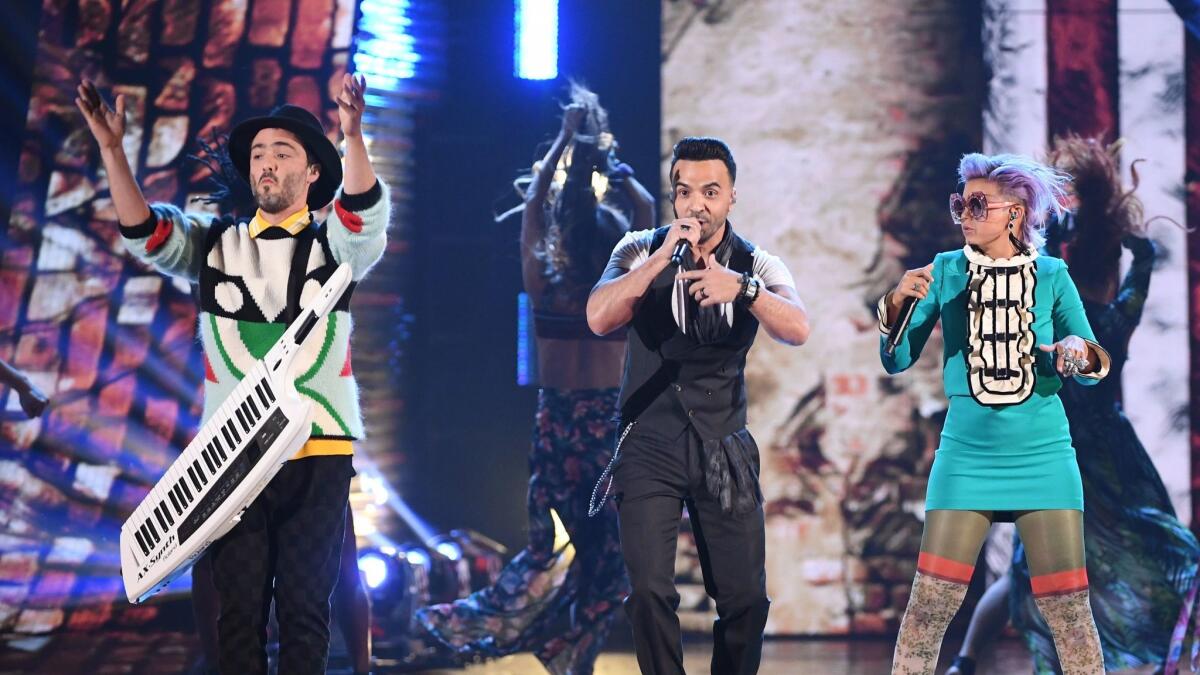
In between, “Hamilton” creator Lin-Manuel Miranda, who is of Puerto Rican origin, was honored with the President’s Merit Award by the head of the Latin Recording Academy, Gabriel Abaroa. He used his speech as an opportunity to make a plea for the island.
Miranda called on viewers to turn out for the Unity March for Puerto Rico to be held in Washington on Sunday — “to remind the White House and Congress that we are human.”
Then he added, forcefully: “This is for Puerto Rico, Puerto Rico, Puerto Rico, Puerto Rico.”
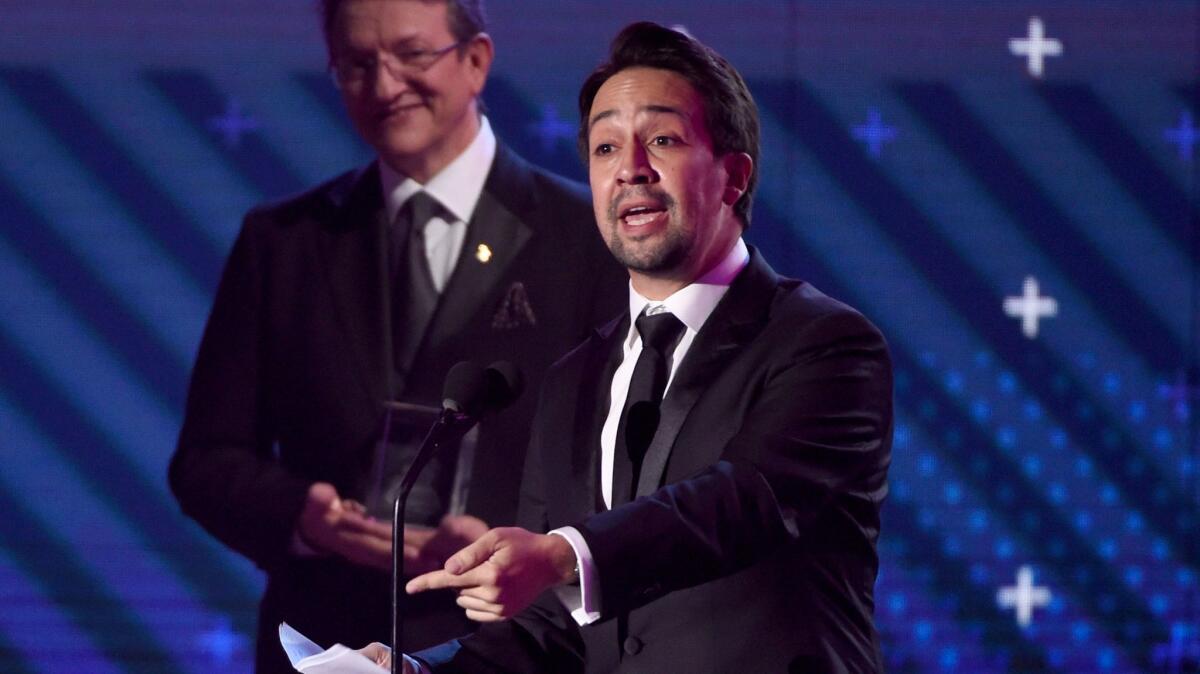
What is normally a joyous affair bore notes of melancholy as performers from across genres acknowledged the recent natural disasters in Latin America.
Hurricane Maria claimed upward of 450 lives in Puerto Rico — and the island’s infrastructure remains hobbled by the storm. And it wasn’t the only site of devastation: more than 360 people died when a magnitude 7.1 quake struck central Mexico on Sept. 19. (The Latin Recording Academy had been set to unveil the nominees for the show on that day, but postponed the announcement when the quake struck.)
To pay tribute to the two nations, folk-pop singer Lila Downs and the Mexican regional act Banda el Recodo de Cruz Lizárraga teamed up for updated renditions of the classic tunes “Viva Mexico” and “En Mi Viejo San Juan,” the latter a bolero about bidding adieu to the Puerto Rican capital. Downs’ majestic vocals, combined with Banda el Recodo’s bouncy brass, gave it just the right amount of uplift.
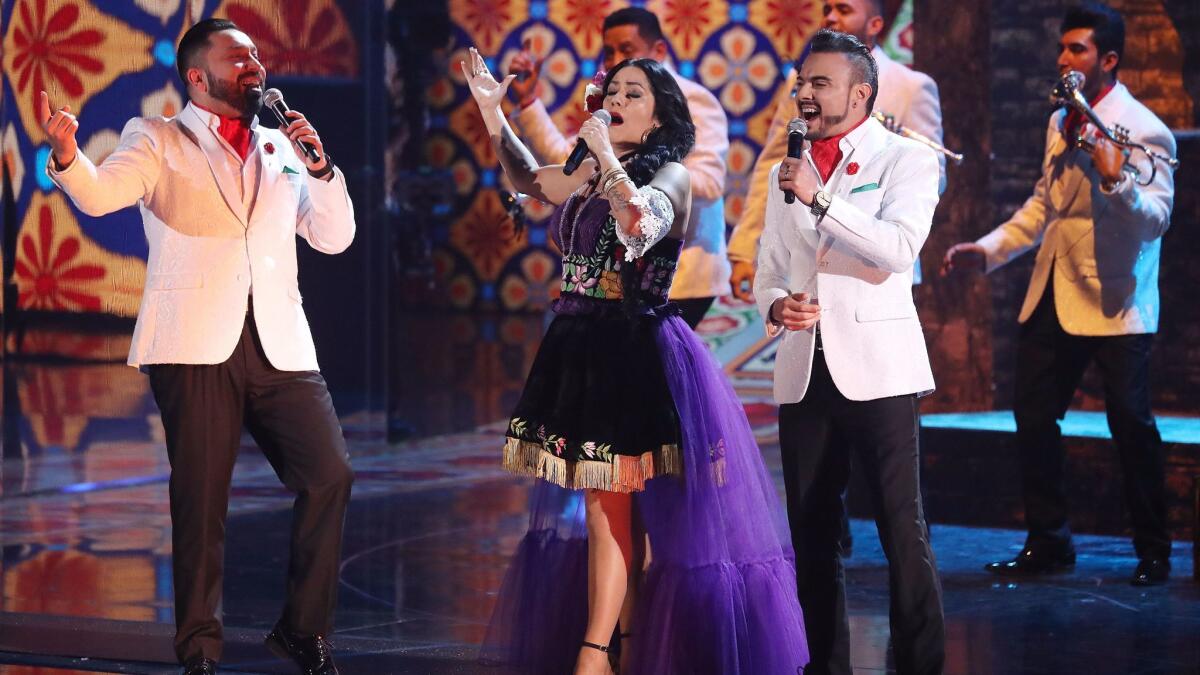
The disasters weren’t the only current events that seeped into the telecast (broadcast, as is customary, on the Univision network).
Spanish crooner Alejandro Sanz, named the Latin Recording Academy’s Person of the Year, dedicated his award to recipients of the Deferred Action for Childhood Arrivals Program, or DACA, an Obama administration immigration program that allowed young adults who were brought to the U.S. illegally as children to remain in the country.
“They are dreamers, they are our children, they are from our community,” he stated. “This goes to them.”
He followed the speech with a performance of his 2004 flamenco-tinged hit “Corazón Partío” backed by a chorus of DACA recipients wearing T-shirts that read: “We have one dream.”
Of that performance, Miranda tweeted: “Not a dry eye in the house after @AlejandroSanz #DreamActNOW.”
None of this is to say that this year’s Latin Grammy Awards was all gloom and doom.
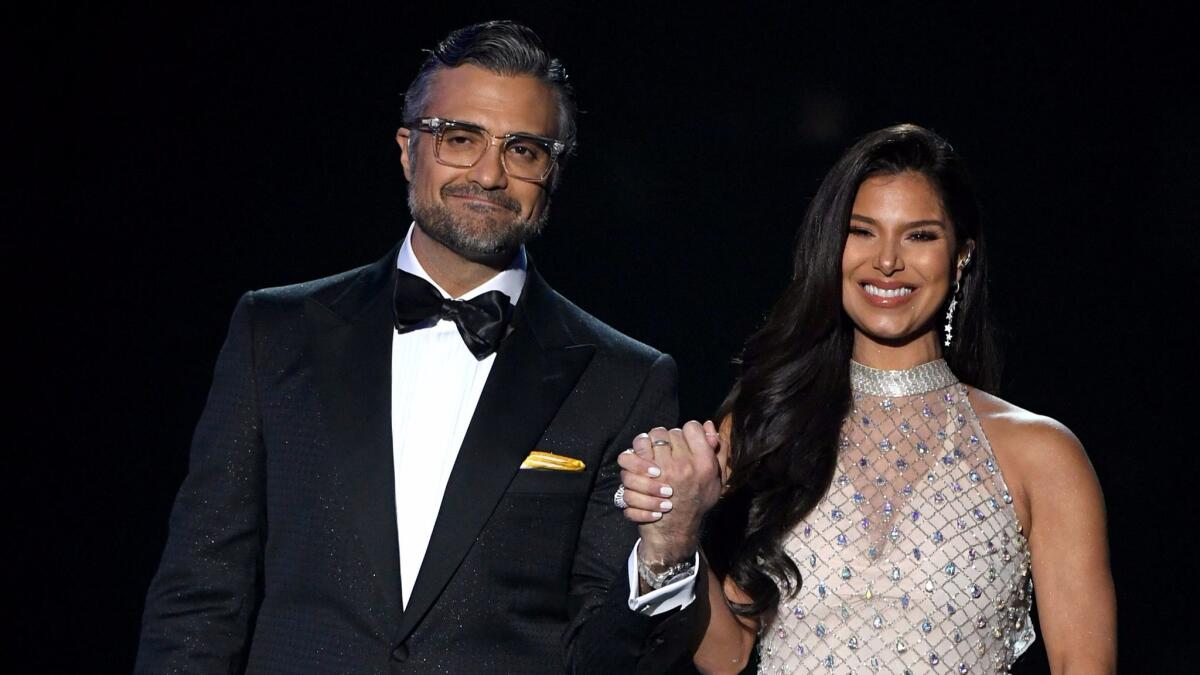
For the most part, the show didn’t deviate from the now hardened Grammy formula of copious pop medleys punctuated by the presentation of the occasional trophy. On deck as hosts were actors Roselyn Sanchez and Jaime Camil (of “Jane the Virgin” fame) — the latter of whom brought an easy charm to a difficult job.
Naturally, the big question going in was how many trophies Fonsi would be taking home for the megahit “Despacito.” The answer: a bunch.
The single, a duet featuring Fonsi and reggaeton star Daddy Yankee, received four nominations — for record of the year, song of the year, short form music video and urban fusion remix — and it won in every category in which it was nominated, making it the top winner overall. (Even the remix version featuring Justin Bieber took home an award.)
“What a privilege to make songs, to communicate through music,” Fonsi said in his acceptance speech. “Long live music in Spanish.”

Fonsi had received far fewer nominations than Residente, whose critically acclaimed self-titled album explored a panoply of global sounds. The rapper had garnered a whopping nine nominations, but ended up taking home two: one for urban music album, the other for urban song.
One of the evening’s surprises was the strong showing by Dominican singer-songwriter Vicente García, known for his low-key, bachata-inflected pop. He took home three Latin Grammys, including best new artist, singer-songwriter album and tropical song (for his single “Bachata en Kingston”).
The other surprise involved Ruben Blades, the Panamanian statesman of salsa. The singer and actor (he’s a regular on “Fear the Walking Dead”) had three nominations for his album, “Salsa Big Band,” which he recorded in collaboration with the Panamanian big band Roberto Delgado & Orquesta. He won two awards.
When Blades’ name was called for album of the year, a highly competitive category that featured works by high-profile acts such as Residente, Juanes, Shakira and Nicky Jam, no one seemed more shocked than Blades himself, who took a few seconds to compose himself before walking up to the stage.
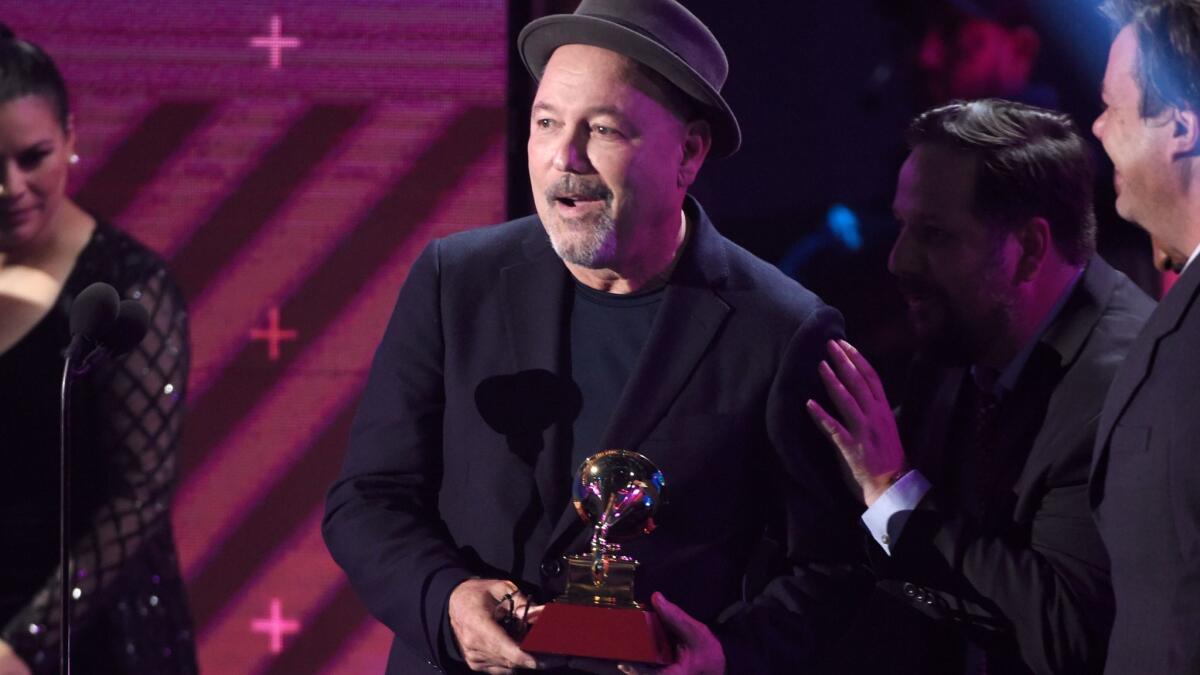
As members of the orchestra celebrated around him, he said, “Success is never the work of just one person. I have the common sense to work with people who know more than me and who are better than me.”
Colombian singer Juanes picked up the pop-rock award for his album “Mis planes son amarte,” while Mexican rockers Café Tacvba snagged a trophy for alternative music album, for their most recent release, “Jei Beibi.” Shakira won for contemporary pop vocal album, while Colombian rockers Diamante Eléctrico received two trophies: for rock album and rock song.
Thursday’s ceremony didn’t have any performances that were quite on par with last year’s can’t-peel-your-eyes-away Jennifer Lopez/Marc Anthony duet, in which the couple serenaded each other across the stage to the tune of Pimpinela’s totally ’80s breakup song: “Olvídame y Pega la Vuelta” (“Forget Me and Get Out of Here”).
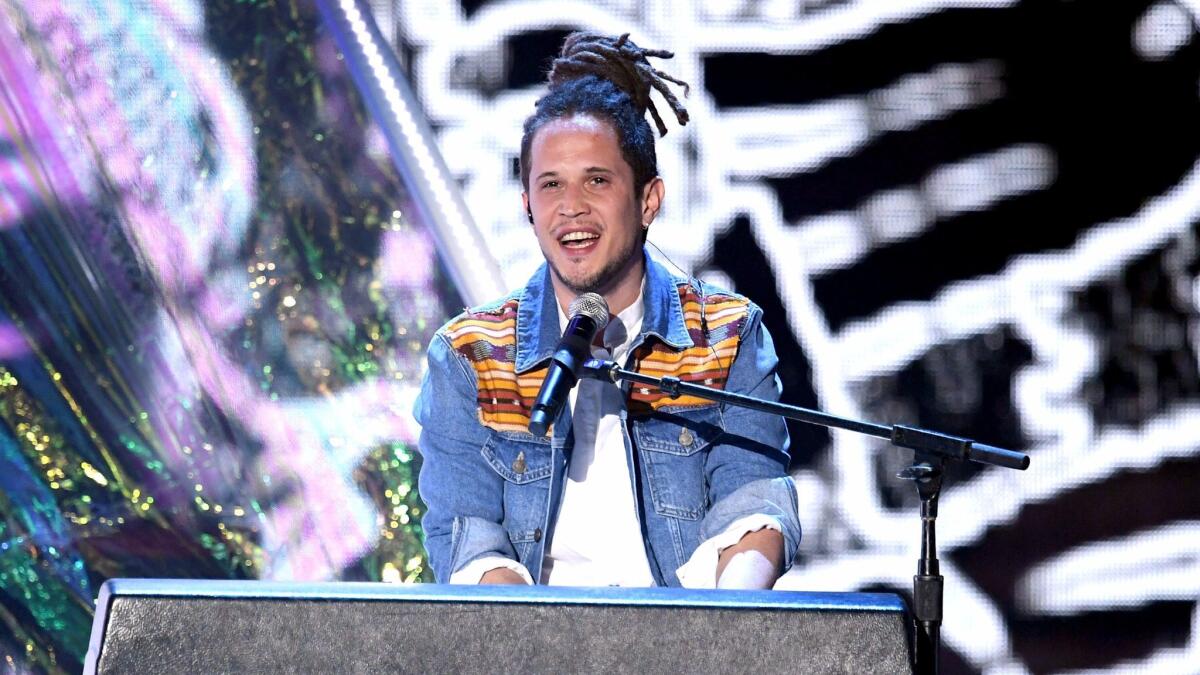
In fact, if anything, this year seemed to be a regression into the academy’s bad habit of chopping up songs into countless medleys and duets, many of which sound like they were devised by a boardroom full of record company executives.
A medley featuring the nominees for best new artist — García, along with Danay Suarez, Sofía Reyes, and Mau y Ricky — provided little time to each artist, creating the sensation of high-speed channel flipping.
J Balvin, who knows how to put on a stage show, was also saddled with a medley — one didn’t take off until he got to the popular “Mi Gente.” And then just as he got everyone dancing, it was over.
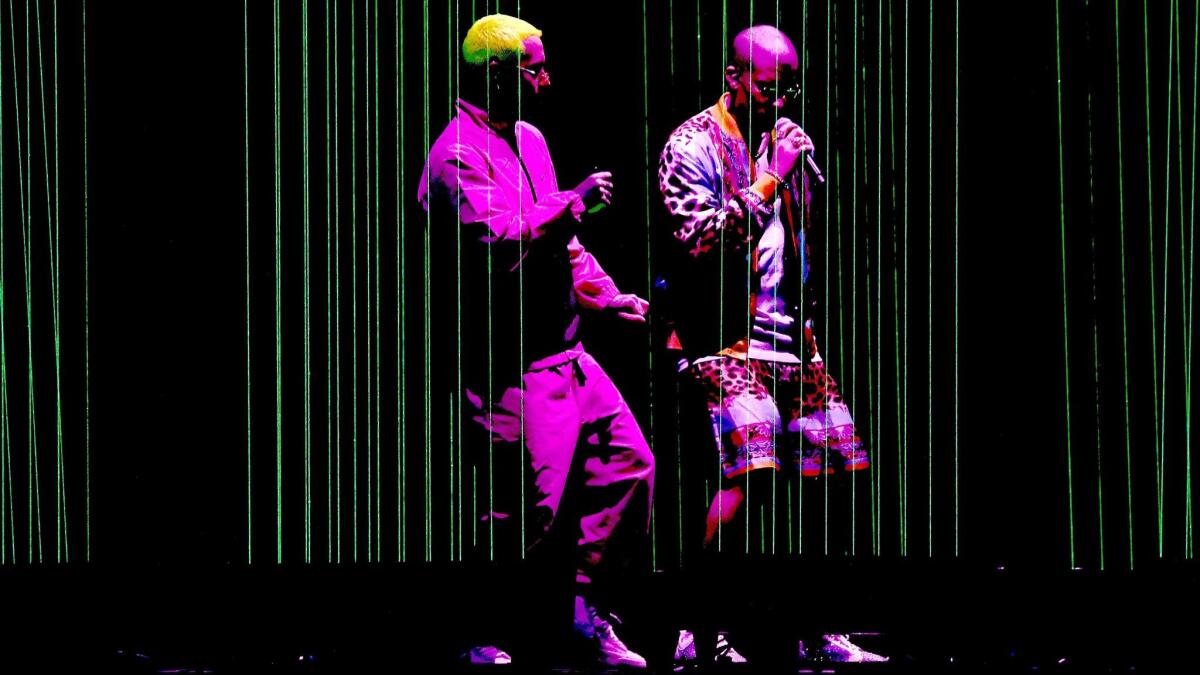
That doesn’t mean there weren’t standouts.
The pairing of the Mexican regional act Bronco with the pop duo Ha*Ash might seem like it would not work — except it did, producing a genuinely groovy bit of pop with a norteño bounce on Armando Manzanero’s classic bolero “Adoro.”
Likewise, Colombian singers Carlos Vives and Sebastian Yatra displayed a genuine and joyous musical rapport on their vallenato-inflected duet “Robarte un Beso.” Nicky Jam got the house moving to his chilled-out reggaeton tune “El Amante” — which started acoustic, before crescendoing into something more danceable.
And Chilean pop star Mon Laferte made up for the general shortage of women by commanding the stage with a strong performance of her cumbia-inspired single “Amarrame” against a psychedelic backdrop of flowers.

That said, the issues that the Latin Grammys face are bigger than any one show.
For one, the show marginalizes Mexican regional music, overwhelmingly favoring pop. And the awards’ musical categories do not necessarily reflect the rapidly evolving nature of music.
Even as reggaeton remains a force onstage, for example, it is often limited to the “urban” category. And it remains “urban” even though in recent years reggaeton has gone increasingly pop — sung by boy bands such as CNCO (who performed its song “Reggaeton Lento” as part of the show).
Moreover, the show’s producers seem to have a single set of performers on rotation. Vives, who performed this year, also performed last year. Banda El Recodo appears to be the go-to Mexican regional band. It was on the telecast two years ago. So was reggaeton singer Nicky Jam. Juanes is a regular repeat performer, as is Balvin.
It’s time to shake things up.
In his acceptance speech for urban song, Residente made a case putting art above metrics such as clicks and downloads.
“Art doesn’t have to do with numbers,” he stated. “We’re not numbers. We’re not data.”
For the show’s producers, setting aside the data, and focusing on the art, might be a good place to start.

Sign up for our weekly Essential Arts & Culture newsletter »
Twitter:
More to Read
The biggest entertainment stories
Get our big stories about Hollywood, film, television, music, arts, culture and more right in your inbox as soon as they publish.
You may occasionally receive promotional content from the Los Angeles Times.
